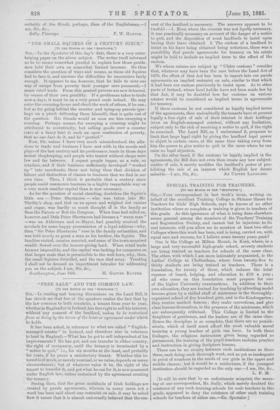"FREE SALE" AND THE COMMON LAW.
[TO THE EDITOR OF THE "SPECTATOR."]
S111,—Ia reading and hearing discussions on the Land Bill, it has struck me that few of the speakers realise the fact that by the law common to both countries, a tenant from year to year, whether in England or in Ireland, has free right to sell his interest, without any consent of the landlord, unless he be restrained from so doing by the terms of the lease or agreement 'under-which he holds.
It has been asked, in reference to what are called "English- managed estates" in Ireland, and therefore also in reference to land in England,—What has he got to sell independent of his improvements P He has got, and can transfer in either country, the right of occupancy, until the tenancy is terminated by a "notice to quit," i.e., for six months at the least, and probably for years, if 'he prove a satisfactory ttinant. Whether this in- , terest is of much, or merely nominal, or no value, depends on many circumstances ; but of whatever value it be, the right of the tenant to transfer it, and get what he can for it, is now possessed , under English law, unless restrained by the agreement creating the tenancy.
Seeing, then, that the great multitude of Irish holdings are created by parole agreements, wherein in many cases not a word has been said about any restraint on sale, it may be asked how it conies that it is almost universally believed that the con-
sent of the landlord is necessary. The answers appears to be twofold :-1. Even where the consent was not legally necessary, it was practically necessary on account of the danger of a notice to quit, and the disposition of most landlords to insist upon having their leave obtained. 2. The custom of a landlord to insist on his leave being obtained being notorious, there was a possibility that parole agreements for tenancy on his estate might be held to include an implied term to the effect of the custom.
We whose estates are subject to "Ulster customs" consider that, whatever may have been the case before the Land Act of 1870, the effect of that Act has been to import into our parole agreements an implied restraint on sale, similar to that which it had, been our custom previously to insist upon. As to other parts of Ireland, where local habits have not been made law by that Act, it may be doubtful how far customs on various estates would be considered as implied terms in agreements for tenancy.
If those customs be not considered as legally implied terms of the agreements, then undoubtedly the tenants have at present legally a free right of sale of their interest in their holdings (even on English-managed estates), without any limitation, subject only to the risk of receiving a notice to quit, if the right be exercised. The Land Bill, as I understand it, proposes to limit that large legal right by giving the landlord legal power to object in certain eases, at the same time taking away from him the power to give notice to quit in the cases where he can raise no legal objection.
On the other hand, if the customs be legally implied in the agreements, the Bill does not even then create any new subject- matter of sale, it merely modifies the landlord's power of pro- hibiting the sale of an interest which English law deems



















 Previous page
Previous page